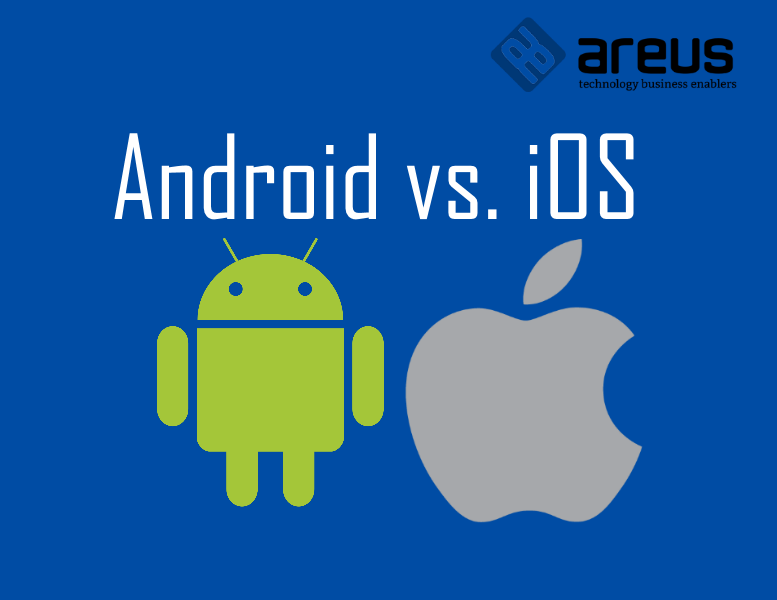

With Android and iOS taking up over 95% of the market share, the choice of the mobile app platform usually comes down to these two options. Yet, the decision is not as easy as it seems and its consequences may be very serious for your business. This is why today at Areus, we discuss the 5 main factors that you should take into account when choosing a platform for your mobile app.
1. Who are your users?
The first factor that you should take into account when choosing a mobile platform is the target group. The demographics of the two user groups differ significantly. For instance, iOS users are mostly located in North America and Western Europe. They are proven to be more loyal towards their device provider and tend to spend more on online purchases. It is also considered that most of the online influencers and early adopters are using iOS, which may be an important beneficial factor in the first stages of your app promotion.
On the other hand, Android users dominate among the developing countries and, rather than a brand, are lead by the price-quality ratio of a device. However, the huge advantage of Android users is their number – in 2017, they were twice as many as iOS users!
2. What is your revenue model?
There are two main revenue models in case of mobile apps. First of them is in-app purchases. Here iOS is an unquestioned leader. Having almost 50% fewer users than Android, in 2016 Apple App Store brought 64% more revenue. Clearly, iOS users tend to invest more in their smartphone services.
Nevertheless, choosing Android can be advantageous if you plan to base your revenue stream on advertisements. A huge number of users makes it easy to reach a higher amount of downloads.
3. Development complexity and time
One of the biggest disadvantages of Android is the number of available versions of the operating system and the vast array of devices that they are used on. Different screen sizes and aspect ratios all have to be considered when developing a truly responsive app. Responsiveness is crucial especially because none of the versions stands for more than 30% of the Android market.
It is quite the opposite in case of iOS. There are only three Apple devices running this OS – iPhone, iPod, and iPad. What is more, statistics show that over 85% of them are regularly updated to the newest version of iOS. This minimizes the development complexity and reduces the amount of testing needed across different devices. Due to this factor, it is calculated that developing an Android app may take up to 40% longer and thus significantly hold off the release time.
4. Development costs
Based on the described above needs for multiple app versions and longer lead time, Android may seem to be a more expensive platform. However, there are other factors that should be taken into account.
Thanks to the high availability of Android Studio, which can be installed on any desktop device for free, the initial costs for young developers are very low. What is more, simple Android apps can be developed with a mere use of Java. In contrast, developing an iOS application requires specifically a Mac computer. As a result, finding an Android developer may be easier and less costly.
5. Release process
The release costs for both platforms are moderate. In case of Google Store, it’s one-off payment of $25 per application. In case of Apple App Store, it’s a $100 yearly fee for unlimited releases. However, it’s not the cost that may be the biggest obstacle here.
Android apps can be published within hours from uploading, without virtually any evaluation. Apple, on the other hand, gives every new app a complex review, which may delay the publication by days, if not weeks. There’s also a risk of not having the app offered to the public at all or having to implement suggested changes, which entails further costs.
Why not both?
The ultimate goal of every mobile app is to reach the highest number of users and that can only be achieved by being present on both platforms. Why not start with Android and iOS simultaneously then?
First off, it is expensive. Big differences between the two technologies require two separate teams of developers working on different equipment. Most importantly, however – it is very risky. Freshly released apps always require changes dictated by the feedback from the customers. It is thus recommended to focus on one platform during the early phase of mobile app lifetime. Thanks to this learning experience, expanding to other platforms will be faster, cheaper and more successful.
Next step
Not sure which platform to choose? Contact us here and let us offer you professional advice. At Areus, we are experts in mobile app development on all the major platforms – Android, iOS, and Windows.





